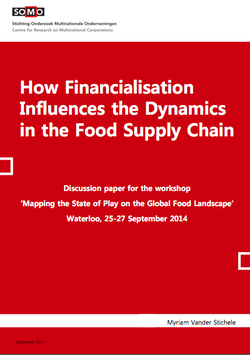SOMO | September 2014
How financialisation influences the dynamics in the food supply chain
by Myriam Vander Stichele
Discussion paper for the workshop ‘Mapping the State of Play on the Global Food Landscape’ Waterloo, 25-27 September 2014
This paper provides a brief analysis of the financialisation of the food supply chain and its impact on the agricultural sector. The growing interlinkages between the financial sector and the agri-food sector have shaped to a large extent the prevailing dynamics of the latter, from land ownership to food retail. The different parts of this paper describe the different ways and means, and ever further levels of financialisation.
First, financialisation has led companies in the agro-food sector to prioritise financial profits and the interests of financial stakeholders over those of other stakeholders. Second, the financial sector increasingly influences how the food supply chain is structured and how decisions are made at various points along the chain. Third, the financial sector itself has increasingly used the agri-food sector as a basis to expand its financial business by developing and offering, often speculative, financial instruments and services that cause and further deepen financialisation. The agricultural derivatives markets are a typical example. Fourth, some agribusiness themselves offer financial services or act as the financial industry.
The agricultural sector and the food industry are attractive to the financial industry for a number of reasons. Expectations of long-term growth in food demand and increasing food scarcity make food-related companies attractive investments. Moreover, the inherent uncertainty and risks involved in agricultural production are appealing to financial players, as the greater the risk and volatility, the higher the potential returns. A wide variety of financial players are involved in the agri-food sector, such as individual investors, institutional investors including pension funds, commercial and investment banks, insurance companies, hedge funds, private equity funds, stock exchanges, agricultural exchanges and other trading venues for agricultural commodity derivatives, fund managers, financial advisors, etc.
The dynamics resulting from this financialisation of the food supply chain is distorting the main function of the agri-food sector, which is to provide nutritious food to as many people as possible in an environmentally and socially sustainable way. To restore this function, an important step to be taken is to expose the ways in which the financial sector's growing influence is having a negative impact on the agri-food sector. The following step is to hold financial players accountable for the distortions they cause. In addition, other ways must be found outside the financial sector to support and finance a more equitable distribution of income along the food supply chain, the provision of food for all members of society, and healthy food consumption.
PDF
How financialisation influences the dynamics in the food supply chain
by Myriam Vander Stichele
Discussion paper for the workshop ‘Mapping the State of Play on the Global Food Landscape’ Waterloo, 25-27 September 2014
This paper provides a brief analysis of the financialisation of the food supply chain and its impact on the agricultural sector. The growing interlinkages between the financial sector and the agri-food sector have shaped to a large extent the prevailing dynamics of the latter, from land ownership to food retail. The different parts of this paper describe the different ways and means, and ever further levels of financialisation.
First, financialisation has led companies in the agro-food sector to prioritise financial profits and the interests of financial stakeholders over those of other stakeholders. Second, the financial sector increasingly influences how the food supply chain is structured and how decisions are made at various points along the chain. Third, the financial sector itself has increasingly used the agri-food sector as a basis to expand its financial business by developing and offering, often speculative, financial instruments and services that cause and further deepen financialisation. The agricultural derivatives markets are a typical example. Fourth, some agribusiness themselves offer financial services or act as the financial industry.
The agricultural sector and the food industry are attractive to the financial industry for a number of reasons. Expectations of long-term growth in food demand and increasing food scarcity make food-related companies attractive investments. Moreover, the inherent uncertainty and risks involved in agricultural production are appealing to financial players, as the greater the risk and volatility, the higher the potential returns. A wide variety of financial players are involved in the agri-food sector, such as individual investors, institutional investors including pension funds, commercial and investment banks, insurance companies, hedge funds, private equity funds, stock exchanges, agricultural exchanges and other trading venues for agricultural commodity derivatives, fund managers, financial advisors, etc.
The dynamics resulting from this financialisation of the food supply chain is distorting the main function of the agri-food sector, which is to provide nutritious food to as many people as possible in an environmentally and socially sustainable way. To restore this function, an important step to be taken is to expose the ways in which the financial sector's growing influence is having a negative impact on the agri-food sector. The following step is to hold financial players accountable for the distortions they cause. In addition, other ways must be found outside the financial sector to support and finance a more equitable distribution of income along the food supply chain, the provision of food for all members of society, and healthy food consumption.














